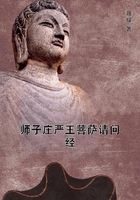Or, "at an equal rent with that which she imposes on her own citizens." See Boeckh, "P. E. A." IV. x. (p. 540, Eng. tr.)But, to make my meaning clearer on the question of maintenance, I will at this point explain in detail how the silver mines may be furnished and extended so as to render them much more useful to the state. Only I would premise that I claim no sort of admiration for anything which I am about to say, as though I had hit upon some recondite discovery. Since half of what I have to say is at the present moment still patent to the eyes of all of us, and as to what belongs to past history, if we are to believe the testimony of our fathers, things were then much of a piece with what is going on now. No, what is really marvellous is that the state, with the fact of so many private persons growing wealthy at her expense, and under her very eyes, should have failed to imitate them. It is an old story, trite enough to those of us who have cared to attend to it, how once on a time Nicias, the son of Niceratus, owned a thousand men in the silver mines, whom he let out to Sosias, a Thracian, on the following terms. Sosias was to pay him a net obol a day, without charge or deduction, for every slave of the thousand, and be responsible for keeping up the number perpetually at that figure. So again Hipponicus had six hundred slaves let out on the same principle, which brought him in a net mina a day without charge or deduction. Then there was Philemonides, with three hundred, bringing him in half a mina, and others, I make no doubt there were, making profits in proportion to their respective resources and capital. But there is no need to revert to ancient history. At the presentmoment there are hundreds of human beings in the mines let out on the same principle. And given that my proposal were carried into effect, the only novelty in it is that, just as the individual in acquiring the ownership of a gang of slaves finds himself at once provided with a permanent source of income, so the state, in like fashion, should possess herself of a body of public slaves, to the number, say, of three for every Athenian citizen. As to the feasability of our proposals, I challenge any one whom it may concern to test the scheme point by point, and to give his verdict.
Reading {para ton pateron}, with Zurborg, after Wilamowitz- Mollendorf.
See "Mem." II. v. 2; Plut. "Nicias," 4; "Athen." vi. 272. See an important criticism of Boeckh's view by Cornewall Lewis, translation of "P. E. A." p. 675 foll.
Reading {parekhein}, or if {pareikhen}, transl. "whilst he himself kept up the number." See H. hagen in "Journ. Philol." x. 19, pp. 34-36; also Zurborg, "Comm." p. 28.
Son of Callias. = L4:1:3 = 600 ob.
Or, "whose incomes would vary in proportion to their working capital." See Jebb, "Theophr." xxvi. 21.
According to the ancient authorities the citizens of Athens numbered about 21,000 at this date, which would give about 63,000 as the number of state-slaves contemplated for the purposes of the scheme. See Zurborg, "Comm." p. 29. "At a census taken in B.C. 309 the number of slaves was returned at 400,000, and it does not seem likely that there were fewer at any time during the classical period."--"A Companion to School Classics" (James Gow), p. 101, xiii. "Population of Attica."With regard to the price then of the men themselves, it is obvious that the public treasury is in a better position to provide funds than any private individuals. What can be easier than for the Council to invite by public proclamation all whom it may concern to bring their slaves, and tobuy up those produced? Assuming the purchase to be effected, is it credible that people will hesitate to hire from the state rather than from the private owner, and actually on the same terms? People have at all events no hesitation at present in hiring consecrated grounds, sacred victims, houses, etc., or in purchasing the right of farming taxes from the state. To ensure the preservation of the purchased property, the treasury can take the same securities precisely from the lessee as it does from those who purchase the right of farming its taxes. Indeed, fraudulent dealing is easier on the part of the man who has purchased such a right than of the man who hires slaves. Since it is not easy to see how the exportation of public money is to be detected, when it differs in no way from private money. Whereas it will take a clever thief to make off with these slaves, marked as they will be with the public stamp, and in face of a heavy penalty attached at once to the sale and exportation of them. Up to this point then it would appear feasible enough for the state to acquire property in men and to keep a safe watch over them.
Or, "senate." See Aristot. "Athen. Pol." for the functions of the Boule.
So Zurborg. See Demosth. "in Mid." 570; Boeckh, "P. E. A." II.
xii. (p. 212, Eng. tr.) See Arnold's note to "Thuc." iii. 50, 7. Or, "diversation," "defalcation." Or, "as far as that goes, then, there is nothing apparently to prevent the state from acquiring property in slaves, and safeguarding the property so acquired."But with reference to an opposite objection which may present itself to the mind of some one: what guarantee is there that, along with the increase in the supply of labourers, there will be a corrsponding demand for their services on the part of contractors? It may be reassuring to note, first of all, that many of those who have already embarked on mining operations will be anxious to increase their staff of labourers by hiring some of these public slaves (remember, they have a large capital at stake; and again, many of the actual labourers now engaged are growing old); and secondly, there are many others, Athenians and foreigners alike, who, though unwilling and indeed incapable of workingphysically in the mines, will be glad enough to earn a livelihood by their wits as superintendents.















